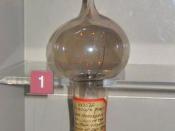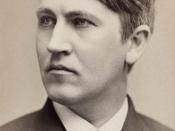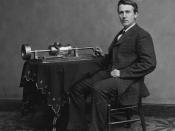The thrust of Edison's work may be seen in the clustering of his patents: 389 for electric light and power, 195 for the phonograph, 150 for the telegraph, 141 for storage batteries, and 34 for the telephone. His life and achievements epitomize the ideal of applied research.
He always invented for necessity, with the object of devising something new that he could manufacture. The basic principles he discovered were derived from practical experiments, invariably by chance, thus reversing the orthodox concept of pure research leading to applied research.
Edison's role as a machine shop operator and small manufacturer was crucial to his success as an inventor.
Unlike other scientists and inventors of the time, who had limited means and lacked a support organization, Edison ran an inventive establishment.
He was the antithesis of the lone inventive genius, although his deafness enforced on him an isolation conducive to conception. His lack of managerial ability was, in an odd way, also a stimulant.
As his own boss, he plunged ahead on projects more prudent men would have shunned, then tended to dissipate the fruits of his inventiveness, so that he was both free and forced to develop new ideas. Few men have matched him in the positiveness of his thinking. Edison never questioned whether something might be done, only how.
Edison's career, the fulfillment of the American dream of rags-to-riches through hard work and intelligence, made him a folk hero to his countrymen. In temperament he was an uninhibited egotist, at once a tyrant to his employees and their most entertaining companion, so that there was never a dull moment with him.
He was charismatic and courted publicity, but he had difficulty socializing and neglected his family. His shafts at the expense of the "long-haired" fraternity of theorists sometimes led formally trained...


